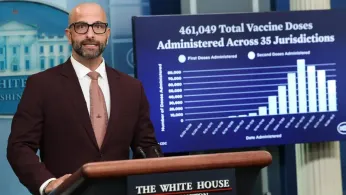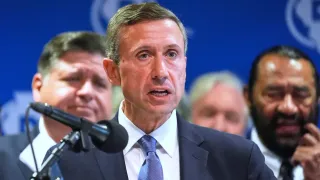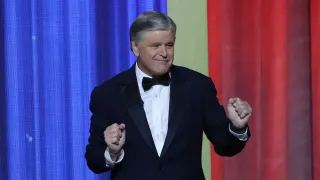
Aug 27
CDC Vaccine Chief Dr. Demetre Daskalakis Resigns, Says "Enough Is Enough"
READ TIME: 4 MIN.
Dr. Demetre Daskalakis, a renowned infectious disease expert and one of the most visible LGBTQ+ leaders in federal public health, has resigned from his position as Director of the National Center for Immunization and Respiratory Diseases at the Centers for Disease Control and Prevention (CDC). In a pointed resignation letter, Daskalakis cited “the ongoing weaponizing of public health” and the increasing pressure from political figures, including former President Donald Trump and current independent presidential candidate Robert F. Kennedy Jr., as central reasons for his decision to step down .
Daskalakis’s resignation is the latest in a growing exodus of senior CDC officials, signaling mounting internal turmoil as the agency faces unprecedented political interference. His departure is particularly significant given his role as a trusted advocate for LGBTQ+ communities and his leadership during public health crises including mpox and the ongoing COVID-19 pandemic .
In his resignation email to CDC staff, Daskalakis wrote: “I am not able to serve in this role any longer because of the ongoing weaponizing of public health. You are the best team I’ve ever worked with, and you continue to shine despite this dark cloud over the agency and our profession” . The statement underscores the growing frustration among career public health officials as scientific guidance is increasingly overshadowed by political agendas.
Daskalakis has long been recognized for his evidence-based approach and for championing the needs of marginalized groups. His resignation letter, described by multiple outlets as “blistering,” did not mince words about the impact of external political forces. “I wish I could say more in person, but wanted to make sure that you all have heard from me directly that I have submitted my resignation,” he wrote, adding that he could no longer serve due to the “dark cloud” hanging over the agency .
The context for Daskalakis’s departure is a charged atmosphere within the CDC. The agency has come under intense scrutiny and pressure as political leaders, including Trump and Kennedy, have elevated anti-vaccine rhetoric and questioned established scientific processes. In recent weeks, Robert F. Kennedy Jr. has openly criticized CDC leadership and advocated for sweeping personnel changes, while Trump’s allies have pushed for greater political control over the agency’s messaging and operations .
Legal representatives for other departing CDC leaders have accused Kennedy of “weaponizing public health for political gain” and “putting millions of American lives at risk by purging health officials from government” . Daskalakis’s resignation amplifies these concerns, highlighting the dangers of subordinating science to politics—particularly for communities that rely on robust, evidence-driven public health policy.
Dr. Daskalakis’s visibility as an openly gay leader has made him a trusted voice for LGBTQ+ health. He played a critical role in the federal response to the mpox outbreak, tailoring outreach and resources to communities disproportionately affected by the virus, including transgender people and men who have sex with men . His departure raises alarms among advocates who fear that ongoing political interference could undermine future efforts to address health disparities.
“Dr. Daskalakis has been an essential advocate for LGBTQ+ health equity, particularly during crises that have uniquely impacted our community,” said a spokesperson for the Human Rights Campaign (HRC), noting that the loss of experienced leadership at the CDC threatens the agency’s ability to respond swiftly and sensitively to emerging public health threats .
Daskalakis is not alone in his decision to leave. Two other senior CDC leaders—Dr. Deb Houry and Dr. Daniel Jernigan—also tendered their resignations this week, each citing similar concerns about the erosion of scientific independence and the politicization of the agency’s work . In her farewell, Dr. Houry wrote, “The ongoing changes prevent me from continuing in my job as a leader of the agency. This is a heartbreaking decision that I make with a heavy heart” .
The trio’s departures come just days after the ouster of the CDC’s director, further destabilizing the agency at a moment when public trust in health institutions is already fragile .
As Daskalakis transitions out of federal service, he has pledged to continue advocating for “science, data, and evidence-based solutions to public health challenges” in his future work . His departure, while a significant loss for the CDC and LGBTQ+ public health advocacy, sends a clear message about the urgent need to safeguard scientific integrity and ensure that policy decisions remain rooted in evidence, not ideology.
Advocacy groups have called on federal leaders to reaffirm their commitment to independent, inclusive public health policy and to ensure that marginalized communities retain a seat at the table during ongoing discussions about the nation’s health priorities .
As the CDC faces a period of uncertainty, many in the LGBTQ+ community and beyond will be watching closely to see whether the agency can withstand political headwinds and continue its mission to protect all Americans—regardless of who they love, how they identify, or where they live.






